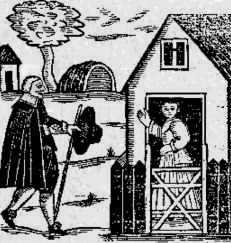The age of marriage
One common belief about the Renaissance is that children, especially girls, married young. In some noble houses marriages were indeed contracted at a young age, for reasons of property and family alliance, but in fact the average age of marriage was quite old--in the middle twenties.
Marriage statistics indicate that the mean marriage age for the Elizabethan and Jacobean eras was higher than many people realize. Data taken from birthdates of women and marriage certificates reveals mean marriage ages to have been as follows:
| 1566-1619 | 27.0 years |
| 1647-1719 | 29.6 years |
| 1719-1779 | 26.8 years |
| 1770-1837 | 25.1 years |
The marriage age of men was probably the same or a bit older than that of women. (In 1619, it was about 23 for women, 26 for men.) The age of consent was 12 for a girl, 14 for a boy, but for most children puberty came two or three years later than it does today.
Oddly enough, there seems to be a period in the late sixteenth century when the mean marriage age of women in and around the area of Stratford-on- Avon dropped as low as 21 years: the mean marriage age from 1580 to 1589 was about 20.6 years, and it was in this decade that Shakespeare, at the age of eighteen, married Anne Hathaway.
The reason for late marriage among labourers and the middle class was simple enough: it took a long time for a couple to acquire enough belongings to set up housekeeping, even in a room of their parents' home. Young love, however romantic, had to be kept in check if the two lovers were to survive in a world where subsistence earnings would not purchase a roof over their heads and put food on the table. Children of noble birth ran a great risk if they tried to marry without the approval of their parents, since they would be left without resources. Perhaps the caution of young Claudio in Much Ado About Nothing has something to do with the fear of acting without permission: he is careful to make sure that his loved one, Hero, is the sole heir to her father's estate (see 1.1.242-243).
Footnotes
-
Juliet
Part of the effect of Shakespearean tragedy is a sense of hyperbole, that one is watching something above or beyond the ordinary. In terms of status, neither Romeo nor Juliet is of outstanding importance in their society; it is their extreme youth that gives the tragedy much of its force--and it is probable that this effect was as true of Shakespeare's audience as of today's.
